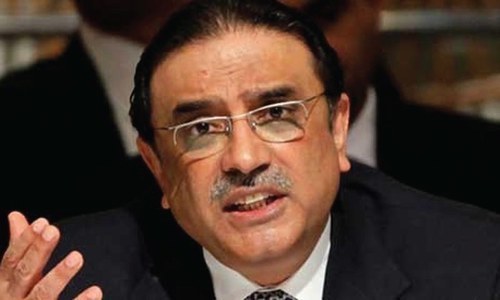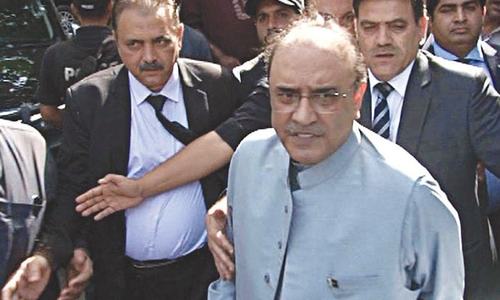The PPP leadership on Thursday voiced concern over the Supreme Court's dismissal of review petitions submitted by those nominated in the fake accounts case and said it would raise the issue of the top court's extent of suo motu powers in the parliament.
The review petitions had been submitted by former president Asif Ali Zardari, his sister Faryal Talpur, the Sindh government, PPP Chairman Bilawal Bhutto-Zardari as well as the Omni Group, seeking a reappraisal of the verdict issued by the top court on January 7.
On January 7, the Supreme Court had tasked the National Accountability Bureau (NAB) with probing the fake accounts case after a joint investigation team (JIT) report revealed that at least 29 bank accounts identified as fake had been used for money laundering to the tune of Rs42 billion. The court had also ordered NAB to wrap up the investigation in two months.
On January 21, NAB Chairman retired Justice Javed Iqbal decided to refer the case to the bureau’s Rawalpindi office.
Following today's dismissal of the review petitions, members of the party announced that both Zardari and Bilawal Bhutto shall hold press conferences tomorrow at Zardari House in Islamabad and in London respectively.
"The kind of treatment being meted out to PPP is unparalleled. One will never find this kind of behaviour anywhere else in the world," said PPP leader Nafisa Shah.
"It has been six months since the launch of an investigation but not even once has Bilawal Bhutto's stance been heard," she regretted.
She said that the disparity between the chief justice's [verbal] orders and the written court order also raises questions.
"On whose orders was Bilawal's name put into the exit control list?" she questioned adding that no response had yet been given for this discriminatory act despite the chief justice questioning the same.
She said it was plain for all to see the kind of drama being staged in the name of accountability.
"Attempts are being made to push the PPP leadership against the wall," she alleged.
She also questioned as to why the rule regarding a case being heard in the court relevant to the case is not being extended to PPP.
She was referring to NAB's decision to transfer the case to the accountability court of Rawalpindi for trial, after the Supreme Court had directed its transfer to either Islamabad or Rawalpindi.
One of the petitions rejected today had declared that the filing of a reference in NAB Rawalpindi was "unlawful" as the "entire alleged record" of the case was in Karachi.
Take a look: Authorities will have to prove I deposited money into fictitious bank accounts: Zardari
Party stalwart Farhatullah Babar, too, expressed his disappointment over the court's decision.
"The extent of the Supreme Court's authority to take suo motu notices on matters needs to be ascertained," he said. The top court had taken a suo motu notice after observing that the FIA had been on the case since 2015 and was yet to wrap it up.
He too expressed regret that Bilawal Bhutto had not been provided the opportunity to say anything in his defence.
"The Supreme Court is the top court in the country against which no appeal can be made," he acknowledged and said that the party respects the decision it has taken today, despite not being in agreement with it.
However, the leader said that the party will gear up to argue the matter in Parliament under Article 184 (3) (Original Jurisdiction of Supreme Court) of the Constitution. He said that the matter will be raised so that legislation can be made to dertermine the reach of the Supreme Court's suo motu powers.
Pakistan Stock Exchange’s former chairman Hussain Lawai, Taha Raza, M/s Omni Group’s chairman Anwer Majeed and his sons and Zain Malik, the son-in-law of real estate tycoon Malik Riaz along with other bankers and businessmen have been booked and detained by the Federal Investigation Agency (FIA) over allegedly facilitating opening of 29 fake bank accounts and money laundering.
Zardari and his sister, Faryal Talpur, have also been named among the suspects and have been granted pre-arrest bail in the case by the banking court.













































